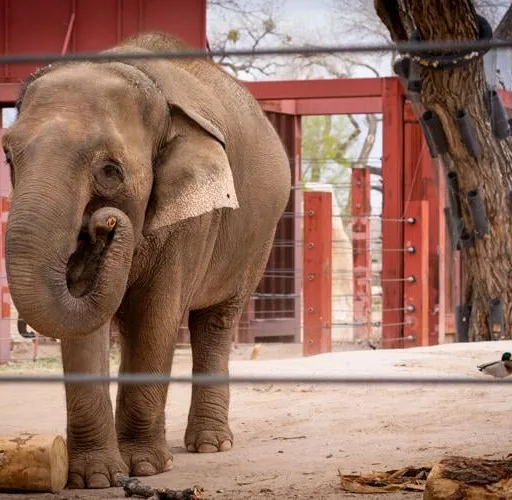
Rozie
Albuquerque Biological Park (Albuquerque, NM)
Rozie is an Asian elephant currently held captive at the Albuquerque Biological Park in Albuquerque, NM. Rozie was born at the zoo on November 8, 1992 to Alice and Ranchipur–who were both born in the wild, captured, and brought to the United States where they were forced into a life of captivity. Rozie has never known freedom. She’s never explored vast natural landscapes, or experienced the rich, complex social life of wild elephants. Rozie grew up in a confined and barren environment, under the constant gaze and control of humans—an environment that has failed to meet the fundamental needs of her species.
Rozie is a female Asian elephant who has spent her entire life in captivity at the ABQ BioPark in Albuquerque, New Mexico. Rozie was born at the zoo on November 8, 1992 to Alice and Ranchipur–who were both born in the wild, captured, and brought to the United States where they were forced into a life of captivity. Rozie has never known freedom. She’s never explored vast natural landscapes, or experienced the rich, complex social life of wild elephants. Rozie grew up in a confined and barren environment, under the constant gaze and control of humans—an environment that has failed to meet the fundamental needs of her species.
In the wild, female Asian elephants live in multigenerational matriarchal herds, roaming large territories and forming deep, lifelong bonds. Rozie has been denied that opportunity. While she shares her enclosure with other elephants, including her mother Alice, her environment lacks the complexity, stimulation, and space elephants require to thrive. The ABQ BioPark’s elephant exhibit spans just a few acres—a fraction of the hundreds of square miles wild elephants inhabit.
Over the past 15 years, Rozie has endured the trauma of four pregnancies and the devastating loss of each of her calves. Her first calf, Daizy, was born in 2009 and died in 2015 from elephant endotheliotropic herpesvirus (EEHV), a disease that has proven deadly for captive-born elephants. Jazmine, born in 2013, died from the same virus in 2022. Thorn, born in 2018, also succumbed to EEHV in 2021. Rozie’s most recent pregnancy ended in December 2024 with a full-term stillbirth. The repeated losses of her offspring—three of them to the same preventable virus—reveal the immense physical and emotional cost captivity imposes on elephants, particularly breeding females.
Despite these tragedies, the ABQ BioPark continues to participate in the Association of Zoos and Aquariums’ (AZA) Asian Elephant Species Survival Plan, a captive breeding program that has repeatedly exploited and failed Rozie and her calves. Though the zoo touts its involvement as a contribution to conservation, Rozie’s case raises urgent questions about the ethics of continuing to breed elephants for the sake of maintaining a captive population in a setting where disease, extreme confinement, and psychological distress are ever-present risks.
While ABQ BioPark has made some updates to its elephant habitat it remains wholly inadequate for meeting the complex needs of Asian elephants. Rozie has spent over 30 years in the same limited, artificial environment, with little change to the conditions that have marked her life with loss, monotony, and confinement.
Rozie’s story is a powerful example of the harms of captivity. Her lifetime of reproductive trauma, emotional deprivation, and physical confinement demands serious reflection. If the ABQ BioPark truly values the interests of its elephants, it must stop prioritizing breeding quotas over well-being and seriously consider transferring Rozie to a sanctuary, where she could finally experience the autonomy, peace, and dignity every elephant deserves.
Take action today
A future where no elephant has to endure the traumas of being torn from their families and natural habitats, bred against their will, and shipped from zoo to zoo is possible, and we need your help to make it a reality.
Submit Information
Do you have a tip for us? The Free to be Elephants project relies on our supporters to keep us up-to-date with the latest news, updates and photos about elephants in their local facilities. Use this form to submit your info and help us expose the reality of elephant captivity across America.